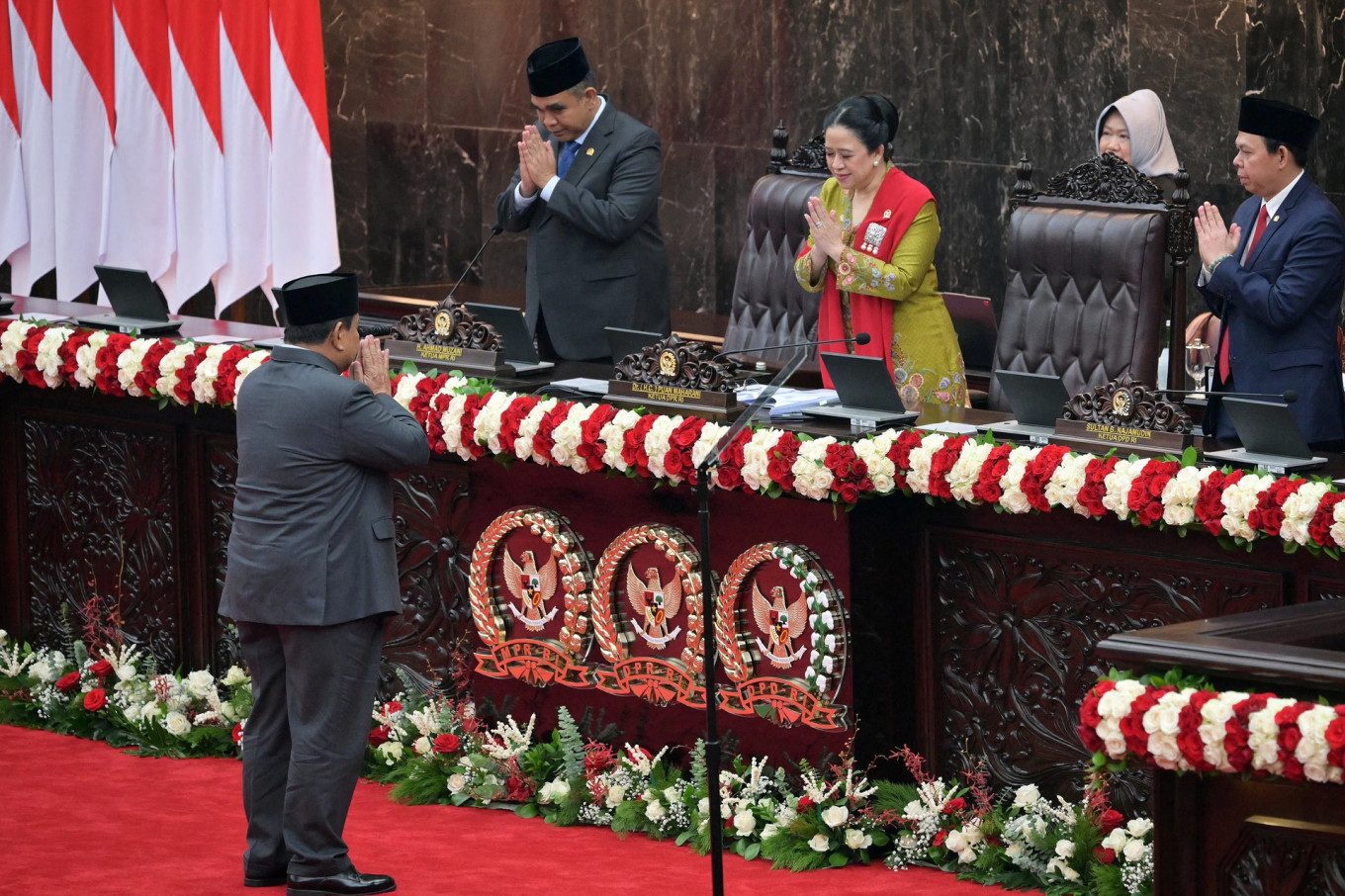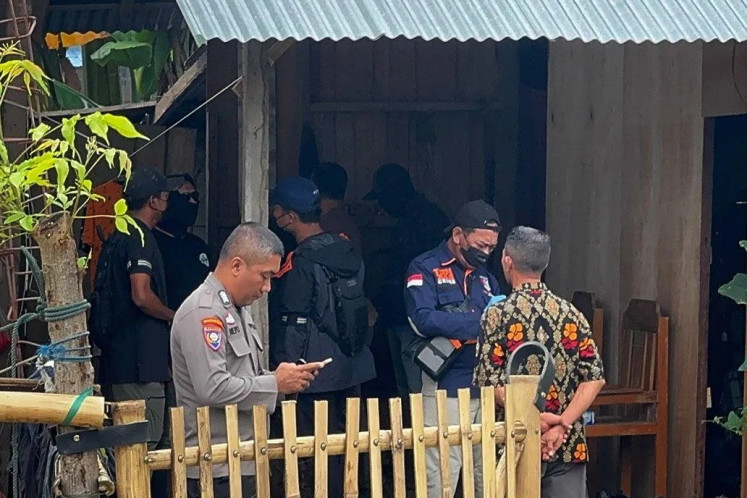Popular Reads
Top Results
Can't find what you're looking for?
View all search resultsPopular Reads
Top Results
Can't find what you're looking for?
View all search resultsCentralization by budget
The conservative budget requires greater capability to generate revenue to finance the flagship programs, and even greater capacity to ensure their implementation in regions.
Change text size
Gift Premium Articles
to Anyone
 President Prabowo Subianto (left) greets People's Consultative Assembly (MPR) Speaker Ahmad Muzani (second left), House of Representatives Speaker Puan Maharani (second right) and Regional Representatives Council (DPD) Speaker Sultan Bachtiar Najamudin (right) before he delivers his annual State of the Nation address during the plenary meeting at the Senayan legislative complex in Jakarta on Aug. 15, 2025, ahead of the country's 80th Independence Day. (AFP/Bay Ismoyo)
President Prabowo Subianto (left) greets People's Consultative Assembly (MPR) Speaker Ahmad Muzani (second left), House of Representatives Speaker Puan Maharani (second right) and Regional Representatives Council (DPD) Speaker Sultan Bachtiar Najamudin (right) before he delivers his annual State of the Nation address during the plenary meeting at the Senayan legislative complex in Jakarta on Aug. 15, 2025, ahead of the country's 80th Independence Day. (AFP/Bay Ismoyo)
A
fter receiving a strong backlash for his bold fiscal policies in the first months of his administration, President Prabowo Subianto is going conservative in the 2026 state budget.
The budget deficit is set at 2.48 percent of GDP, down from the projected deficit of 2.78 percent this year. This is regardless of the fact that the total budget is still rising by 7.3 percent to Rp 3.79 quadrillion (US$233.92 billion).
The budget will be allocated to continue the rollout of the priority programs that the President introduced this year, including the free nutritious meals, free health-screening and village-based development through cooperatives.
And while focusing on these flagship programs, Prabowo has decided to increase central government spending by 17.8 percent to Rp 3.14 quadrillion while reducing regional transfers to local administrations by 24.8 percent to Rp 650 trillion.
The greater role of government amid a global economic slowdown like today is not uncommon. Even in the United States and China, governments are initiating fiscal policies to stimulate the economy and protect people’s welfare.
But in Indonesia, known for its inefficient bureaucracy and corruption, this is not exactly a safe bet. The conservative budget requires greater capability to generate revenue to finance the flagship programs, and even greater capacity to ensure their implementation in the regions.
Unlike three years ago when Indonesia benefited from the world’s economic recovery after COVID-19, the global market today is more precarious. The country’s export earnings from its main commodities, palm oil, nickel and coal, have continued to decline amid rising international trade uncertainty as a result of the US tariff war.
In the 2026 budget, the government is planning to rely on taxes as the main way to anticipate the export earnings shortfall. Finance Minister Sri Mulyani Indrawati has said tax revenue must grow by 13.5 percent year-on-year to keep pace with the state budget plan.
This is considered hard work for the government as the country still has a low tax-to-GDP ratio of around 10 percent, reflecting the low fiscal capacity to fund the state budget. The country also still has poor tax compliance caused by the large informal sector and corruption in tax offices.
The middle class who drive the formal sector have become the easiest target as their individual or corporate incomes are well registered. But feeling the pinch of economic slowdown in the past year, people have become more resistant and more courageous in voicing their disapproval of the government's plans to raise taxes.
In December last year, demonstrators took to the streets to oppose the plan to raise VAT while just last week, thousands of angry residents of Pati, Central Java, rallied in protest after the local administration planned to sharply increase property tax.
Unrest in the regions may increase next year with the smaller amount of regional transfers from the central government. This will force local administrations to be smart and more resourceful in generating their own revenue. And the lesson from Pati shows that it may not be a good idea to squeeze it all out of taxes.
The Prabowo administration may also want to involve local administrations, residents and civil society in every region while rolling out its priority programs. This may prevent the regions feeling left out given the dominance of the central government.
The experience from this year shows that Prabowo trusts the military and police more in rolling out these priority programs. Not only is this somewhat draining, as servicemen are left to make the greatest efforts, it also wastes the potential of local people who have the much-needed knowledge and expertise to implement the programs.
By now, we may have come to realize that the President aims for massive-scale programs with nationwide impact. This requires hard work, and the government will exhaust itself if it maintains its centralized, top-down approach.
Instead of becoming a device for centralization, the state budget should become a platform to accommodate and grow the economy and tap the potential of the regions themselves and how they connect to the national level. It should not become a tool to control, but a tool to collaborate.










